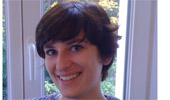The Physics & Astronomy Colloquium Series presents Sharon Meidt of the Max Planck Institute for Astronomy on “How Gas Forms Stars: The Influence of Galaxy Dynamics” at a special time on Monday, Jan. 27, at 4:10 p.m. in Walter 245.
Abstract: The nature of star formation is one of the prevailing issues in modern astronomy. I will describe how the way we interpret this process is changing, enabled by high-resolution observations of nearby galaxies and new insights in to the role of galaxy dynamics. Gas motions on large scales in galaxies affect its organization and structuring all the way down to the seeds of star formation, giant molecular clouds (GMCs). New evidence suggests that GMCs inherit their properties from their surroundings; they are not isolated entities, dynamically decoupled from their environment. This sensitivity to environment challenges the idea behind a ‘universal’ GMC that lies at the heart of standard theories of star formation. I will describe how gas motions driven by non-axisymmetric bar/spiral instabilities mediate the link between a cloud and its surroundings and thus determine its ability to collapse and form stars. The result is that very specific patterns in global star formation are introduced within galaxies, with the rate at which gas is transformed into stars varying by up to an order of magnitude. This impact of gas motions on star formation activity affects our understanding of disk formation across cosmic time.
Upcoming Spring 2014 Events
Colloquia are held in the Walter Hall, Room 245, on Fridays at 4:10 p.m. unless otherwise noted.
Ryan Chornock of Harvard-Smithsonian Center for Astrophysics on “Transient Astronomy and the Violent Deaths of Stars” at a special time on Wednesday, Jan. 29, at 4:10 p.m. in Walter 245.
Henry Clark of Texas A&M University on “Radioactive Ion Beam Physics at the Cyclotron Institute” on Friday, Jan. 31, at 4:10 p.m. in Walter 245.
Jens Dilling of the University of British Columbia on “Understanding the universe, one rare isotope at a time” on Friday, Feb. 7, at 4:10 p.m. in Walter 245.
Michelle Espy of Los Alamos Scientific Lab on “Applications of SQUIDs: from brains to bombs” on Friday, Feb. 21, at 4:10 p.m. in Walter 245.
John Wikswo of Vanderbilt University on “A Physicist’s Perspective on the Complexity of Biology” on Friday, Feb. 28, at 4:10 p.m. in Walter 245.
TBA on Friday, March 14, at 4:10 p.m. in Walter 245.
Serge Nakhmanson of the University of Connecticut on “Computational Design of Multifunctional Complex-oxide Materials Across Length Scales” on Friday, March 21, at 4:10 p.m. in Walter 245.
Maxim Pospelov of the University of Waterlooon “Constraining the Dark Sector with BBN and CMB physics” on Friday, March 28, at 4:10 p.m. in Walter 245.
Jennifer Dionne of Stanford University on “Visualizing chemical reactions and light-matter interactions with nanometer-scale resolution” on Friday, April 4, at 4:10 p.m. in Walter 245.
Robert Austin of Princeton University on “Nonlinear Dynamics” on Friday, April 11, at 4:10 p.m. in Walter 245.
Nick Wu of the West Virginia University on “Plasmon-Enhanced Solar Energy Harvesting” on Friday, April 18, at 4:10 p.m. in Walter 245.
Departmental Awards Gathering on Friday, April 25, at 4:10 p.m. in Walter 245.
















Comments